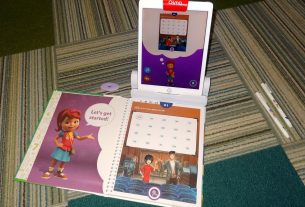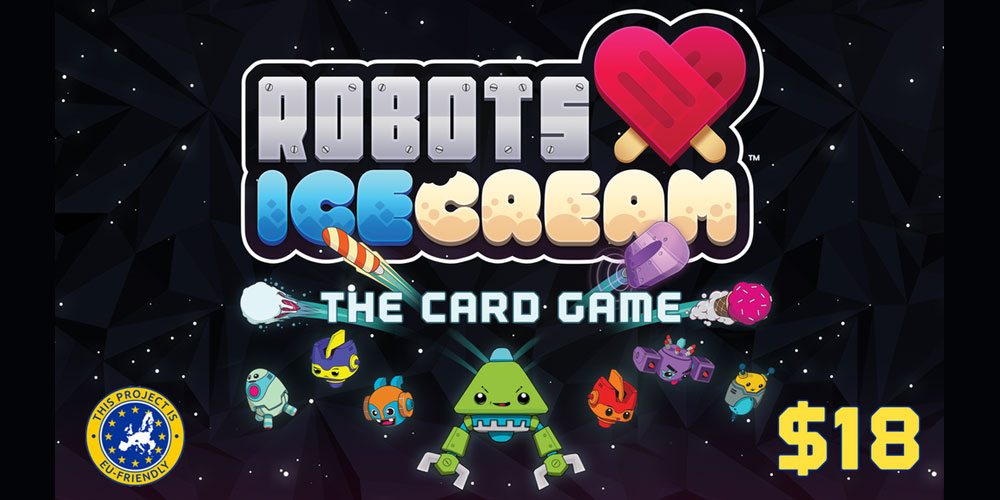I have good news and bad news. The bad news? You’re dead. But the good news is now you’ve got the chance to tell an amazing story about it.
What Is Epilogue?
Epilogue is a cooperative storytelling game for 1 to 10 players, ages 12 and up, and takes about 10–40 minutes to play (depending on how talkative everyone is). It’s currently seeking funding on Kickstarter, with a pledge level of $26 for a copy of the game. (There’s also a $14 print-and-play level, and a $200 level if you want to be drawn as a cartoon ghost in the game!) The game’s theme is telling a story about death, which can go in a lot of different directions, but I would say in general this is something you could play with younger kids as long as they’re able to read and spell a little; it would also be easy to change up the subject matter if you wanted to use the deck to create other stories.
Epilogue was designed by Emma Larkins (whose previous designs include Abandon All Artichokes and Starry Night Sky) and published by Violet Daisy Games, with illustrations by Arnel Baluyot and graphic design by Estefania Rodriguez.
New to Kickstarter? Check out our crowdfunding primer.

Epilogue Components
Note: My review is based on a prototype copy, so it is subject to change and may not reflect final component quality.
The game consists of 26 double-sided tarot-sized cards, each with various word fragments arranged around the edges of the card. There are some cute illustrations of ghosts and random little items that can be used as inspiration for stories, but they aren’t tied to particular letter sequences as far as I can tell.

The word fragments have been cleverly designed so that, according to the publisher, “you can make almost every 3–6 letter word in English.” If you overlap and layer cards, you can make even longer words.
The game also includes 3 quick-start rules cards, and there will also be a pointer token—a little ghost with a foam finger—used to indicate the most recent word, though the prototype did not include that.
How to Play Epilogue
You can download the rulesheet here.
The Goal
The game is a cooperative storytelling game, and there’s no specific victory condition other than telling a fun story together.

Setup
Shuffle the cards and give each player a card. Put a card in the center of the playing area and make a draw pile of 3–4 cards for a short game, or 7–8 cards for a long game, putting the others away. The player who most recently had a spooky encounter goes first.
Gameplay
On your turn, you add your card to the table, connecting somewhere to form a word. Then, you choose another player at the table to start a story about “how you all died,” incorporating the word somewhere in their story. Then, the player who spoke plays a card to the table to form a new word and picks another player to continue the story.

Each time you play a card, you draw a new card from the draw pile (until they run out).
Game End
The game ends when everyone is out of cards—the last player to speak should wrap up the story. (If you want to extend the game, simply add more cards to the draw pile.)
Why You Should Play Epilogue
There are people who like to argue about whether something technically fits a definition of a “game.” I know because I’ve been that person myself (one of my personal factors was ensuring that players actually get to make choices), though I think I’ve mellowed a little in recent years. I remember coming across a taxonomy that included things like “activities” and “puzzles” and “games,” with games having the strictest requirements, including things like needing rules and a way to determine who won. On the other end of the extreme is using the word “game” to mean “anything you can play.”
I bring this up because Epilogue is one of those titles that I can already see people arguing over whether it’s technically a game, because there isn’t really a win or lose condition—you play the cards and tell a story together. I suppose you could say that if nobody is able to come up with a word and you can’t get through all the cards, or if somehow the story falls apart and doesn’t make any sense, then you lose. But really the advice I’d give is: if you’re the sort of person who will get upset if somebody calls it a game and you think it’s an activity, then this might not be for you. On the other hand, if you enjoy telling funny stories with your friends, then these cards can serve as a great set of prompts for creativity. (I say funny stories, though there’s nothing to stop your group from telling scary stories or sad stories, either—it’s just that the cards are colorful and the ghosts are really adorable, so it might spoil the mood a bit if you’re going for something serious.)

Some storytelling games do add a layer of scoring mechanics, but Epilogue keeps it simple and focuses on just working together. While it isn’t strictly for Halloween season, it makes for a nice spooky (or spoopy?) game with its ghostly theme of tales from beyond the grave, so you may expect to find this on one of our future Halloween Games lists. I’ve played with a number of different people, and since you can make so many different words, we always end up with wildly different tales by the end.
Of course, some people are better at storytelling than others, particularly in the ability to incorporate the new word into the existing storyline, but practice can lead to improvement, and either way you can still have fun. This can also be great for kids who are working on reading and spelling, to have them putting together words and looking for connections, and then exercising those improvisational skills too.
For more information or to make a pledge, visit the Epilogue Kickstarter page!
Click here to see all our tabletop game reviews.
![]() To subscribe to GeekDad’s tabletop gaming coverage, please copy this link and add it to your RSS reader.
To subscribe to GeekDad’s tabletop gaming coverage, please copy this link and add it to your RSS reader.
Disclosure: GeekDad received a prototype of this game for review purposes.





